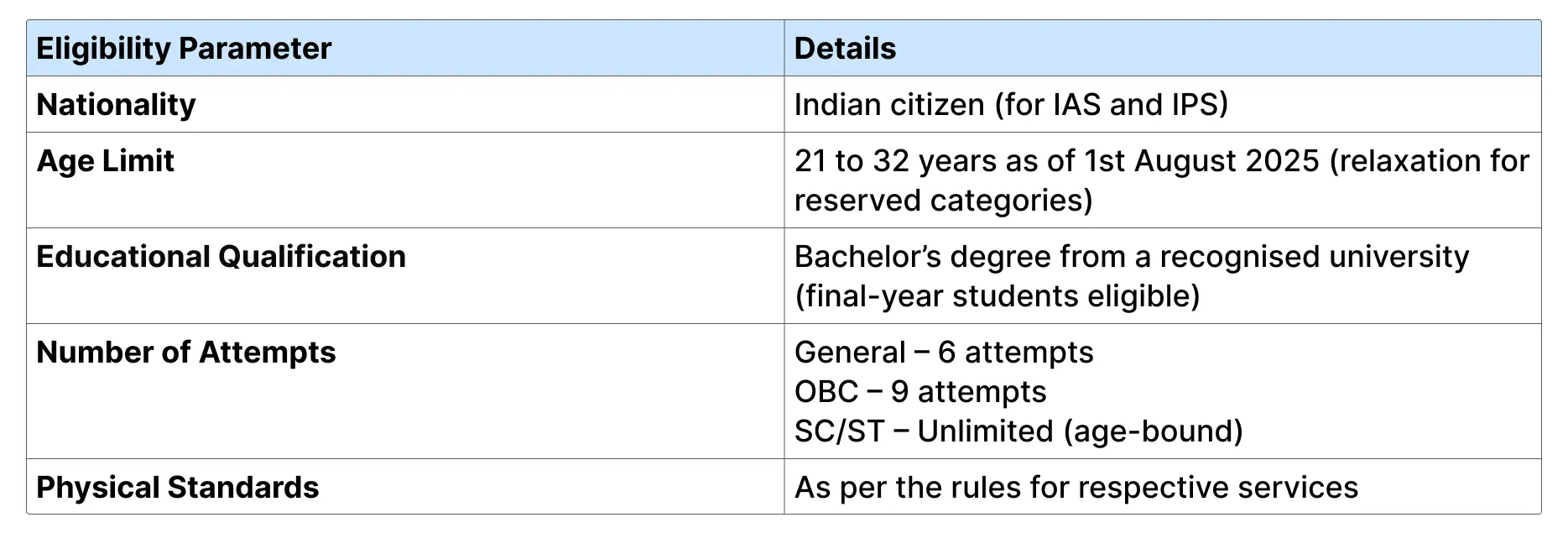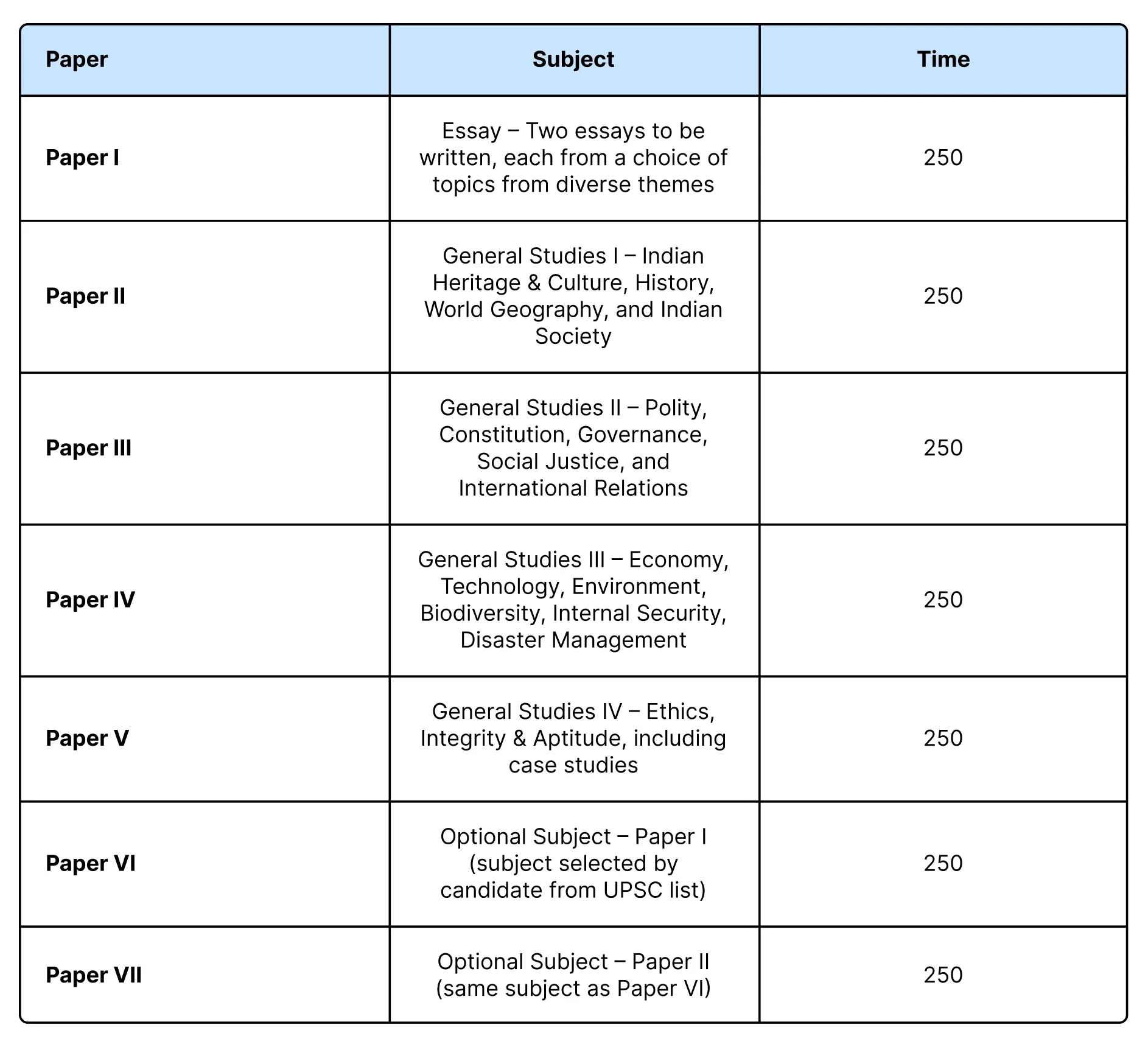July 28, 2025

Are you preparing for the UPSC Civil Services Exam? Then, understanding the IAS syllabus is your first serious milestone.
With over 10 lakh aspirants applying every year and only around 1,000 final selections, clarity on what to study and what to skip can make all the difference.
This blog simplifies the entire syllabus, covering Prelims, Mains, and Optional subjects in a way that’s easy to follow. Whether you're from a Kannada or English medium background, this guide will help you approach your IAS preparation with focus and confidence.

The IAS syllabus is the foundational roadmap for every serious UPSC aspirant. Conducted by the Union Public Service Commission (UPSC), the Civil Services Examination (CSE) selects candidates for top-level posts such as IAS, IPS, IFS, and IRS.
The IAS examination process spans nearly a year and evaluates not just subject knowledge but administrative aptitude, ethical integrity, and clarity of thought.
The examination is conducted in three phases:
Final merit is calculated out of 2025 marks (1750 from Mains + 275 from Interview). Prelims are only a qualifying round, and their marks aren't counted in the final merit list.

Also Read: UPSC Eligibility 2025: Age Limit, Qualifications, and Attempts
The first stage of the exam, the Civil Services Preliminary Exam is conducted to shortlist candidates for the Main Examination.

It has 100 questions which broadly cover the following topics and carry a maximum of 200 marks to be solved in 2 hours:
The UPSC Prelims General Studies Paper-I is designed to test a candidate’s grasp of both foundational concepts (static) and current events (dynamic). A balanced preparation approach is crucial to clear the Prelims cut-off.
Covers well-defined subjects from the NCERTs and standard reference books.
Dynamic Knowledge:
Based on current affairs and recent developments.
Why Both Matter:

It comprises 80 questions from the following topics that carry a maximum of 200 marks to be solved in 2 hours:
General Studies Paper-II of the IAS Exam is a qualifying paper with the minimum qualifying marks fixed at 33%.
A candidate must appear in both the Papers of the IAS Preliminary Exam for evaluation.
Not getting the results you want in KPSC prep? Join ICS Institute, Dharwad. Get clear guidance, regular mock tests, and full support from experts. Start your KPSC journey with ICS today.
The Civil Services Main Examination is the second and most crucial stage of the UPSC selection process. This stage is designed to assess the candidate’s depth of understanding, critical thinking, ability to express thoughts coherently, and awareness of issues across governance, ethics, development, and national/global affairs.
The Main Examination consists of 9 papers, which are categorised as:
Only candidates who obtain the minimum qualifying marks in the Prelims (Paper I) and clear CSAT (Paper II) are eligible to appear in the Mains stage.
Qualifying Papers (Must score at least 25% in each)


English Language:
i. Comprehension of given passages
ii. Precis Writing
iii. Usage and Vocabulary
iv. Short Essays
Indian Languages:
i. Comprehension of given passages
ii. Precis Writing
iii. Usage and Vocabulary
iv. Short Essays
v. Translation from English to the Indian Language and vice-versa
This paper is used to assess a candidate’s ability to think critically, organise ideas logically, and express them effectively in writing. Candidates are required to write essays on multiple topics. They will also be expected to:
This paper helps evaluate awareness of India's cultural roots, historical evolution, and global societal-geographic developments shaping human civilisation.
Indian Heritage and Culture, History and Geography of the World and Society
a. Indian culture – Art Forms, literature, and Architecture from ancient to modern times
b. Modern Indian history from the mid-18th century to the present
c. The Freedom Struggle – stages, contributors, and contributions across regions
d. Post-independence consolidation and reorganisation
e. History of the world – from the 18th century, including the industrial revolution, world wars, political ideologies
f. Salient features of Indian Society, Diversity of India
g. Role of women, population issues, poverty, urbanisation, remedies
h. Effects of globalisation on Indian society
i. Social empowerment, communalism, regionalism, and secularism
j. World’s physical geography
k. Distribution of key natural resources, industrial location factors
l. Geophysical phenomena – earthquakes, tsunamis, cyclones, flora and fauna changes
The paper tests knowledge of the Indian political system, governance mechanisms, social justice, and India's global interactions.
Governance, Constitution, Polity, Social Justice, and International Relations
a. Indian Constitution – evolution, features, amendments, structure
b. Union and State functions; federal issues and finances
c. Separation of powers, redressal mechanisms, and institutions
d. Comparison with other constitutional schemes
e. Parliament and State Legislatures – powers, privileges, functioning
f. Executive and Judiciary – organisation, Ministries, Departments, pressure groups
g. Representation of the People’s Act – salient features
h. Constitutional bodies – appointments, functions
i. Statutory and quasi-judicial bodies
j. Government schemes and policies; implementation issues
k. NGOs, SHGs, charities – their development role
l. Welfare schemes – performance, laws, institutions
m. Social sector – health, education, HRD
n. Poverty and hunger issues
o. Governance, transparency, accountability, e-governance
p. Role of civil services in democracy
q. India and its neighbourhood relations
r. International agreements, global groups involving India
s. Developed and developing countries' policies affecting India, diaspora
t. Important international institutions – structure, mandate
This paper is presented to assess the understanding of economic development, technological applications, environmental sustainability, and internal security concerns.
Technology, Economic Development, Biodiversity, Environment, Security, and Disaster Management
a. Indian Economy – planning, resource mobilisation, development, employment
b. Inclusive growth
c. Government budgeting
d. Major crops – patterns, irrigation, marketing, constraints
e. Farm subsidies, MSPs, PDS, food security, tech missions
f. Food processing – significance, supply chain, location
g. Land reforms
h. Liberalisation – industrial policy changes
i. Infrastructure – energy, ports, rail, airports
j. Investment models
k. Science & Technology – applications in daily life
l. Achievements of Indians in science, indigenisation
m. Awareness in IT, robotics, nanotech, biotech, and IPR issues
n. Conservation, pollution, environmental impact
o. Disaster management
p. Extremism and development linkages
q. Role of state and non-state actors in internal security
r. Security and communication networks, media’s role, cyber security, money laundering
s. Border security, organised crime and terrorism linkages
t. Security agencies and their mandate
This paper tests attitude and approach to issues of integrity, probity in public life, and problem-solving.
Ethics, Integrity and Aptitude
Broad areas include:
a. Ethics and Human Interface – dimensions, consequences, private/public ethics, values from leaders
b. Attitude – content, influence, moral and political attitudes, persuasion
c. Aptitude – foundational values, empathy, tolerance, compassion
d. Emotional Intelligence – applications in governance
e. Moral thinkers from India and the world
f. Ethics in Public Administration – concerns, laws, conscience, ethical governance, corporate governance
g. Probity in Governance – RTI, Codes of Conduct, Citizens’ Charters, corruption challenges
h. Case studies
This paper judges a candidate’s ethical thinking, values, and problem-solving approach in public administration and life. Each candidate may choose one optional subject from the following list:
Each optional subject has two papers of 250 marks each.
Serious about cracking the KPSC KAS Exam 2025? Join ICS Institute for Competitive Examinations, Dharwad, for expert mentorship, mains-focused writing practise, and regular test series designed to match the real exam pattern.
Each candidate may choose one optional subject from the list prescribed by UPSC. The choice should align with the candidate’s academic background, personal interests, and availability of study material.
Popular choices often overlap with GS topics, making preparation efficient. Subjects with a concise syllabus and a proven scoring trend, like Anthropology or Political Science, are widely preferred.
Coaching availability and past performance in mock tests also influence the selection. Careful evaluation of these criteria ensures better preparation and scoring potential across both optional papers, each carrying 250 marks, significantly impacting final rankings.
Also Read: Best IAS Coaching in Hubli and Dharwad

Success in the IAS exam hinges on strategy and discipline. A well-structured plan helps aspirants stay on track from the beginning.
Key strategies include:
ICS Institute supports aspirants with:
With ICS Institute's expert guidance, your IAS preparation becomes smarter and more result-oriented.
Access to previous practise papers
The UPSC Civil Services Examination is one of the most prestigious and challenging competitive exams in the country. By now, you’ve gained a complete overview of the IAS syllabus: Prelims, Mains, and Optional papers, along with paper-wise structure and preparation strategies.
But understanding the syllabus is just the beginning. What truly drives success is consistent effort, the right guidance, and structured practice. ICS Institute of Competitive Examinations offers expert-led coaching, personalised mentorship, and regular assessments to help serious aspirants build a disciplined, exam-ready approach.
Whether you're aiming for IAS, IPS, or any allied service, ICS Institute, trusted by aspirants across North Karnataka, can guide your preparation with proven methods and dedicated support.
Struggling to navigate the vast IAS syllabus? Let ICS Institute streamline your UPSC journey. Reach out today and take the first step toward your civil services dream.
1. Is the UPSC syllabus changing in 2025?
No, the UPSC syllabus for 2025 remains the same as previous years, covering Prelims, Mains, and Optional subjects without any major changes announced.
2. What is the syllabus of UPSC 2025 prelims?
UPSC 2025 Prelims includes two papers: General Studies Paper-I on current affairs, history, geography, polity, economy, environment, and science; and Paper-II (CSAT) on comprehension, reasoning, and basic numeracy.
3. What are the optional subjects in UPSC 2025?
There are 48 optional subjects, including Anthropology, Geography, Political Science, Sociology, Public Administration, History, and various regional literatures, allowing candidates to choose based on their interests and background.
4. What are the important topics for UPSC Prelims 2025?
Important topics include current events, Indian polity and governance, modern Indian history, physical and economic geography, environmental ecology, biodiversity, climate change, and general science with a focus on static and dynamic knowledge.
Boost Your Confidence & Competitive Skills